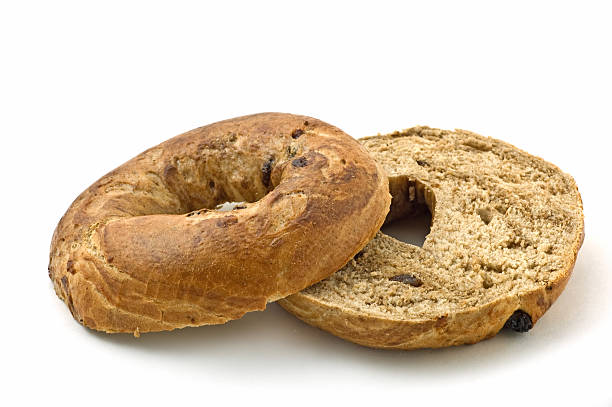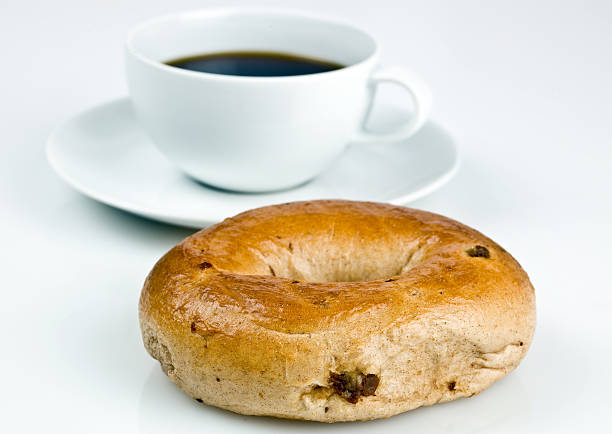A cinnamon raisin bagel is a delicious and convenient breakfast option, but it is important to be aware of its calorie content in order to maintain a balanced diet. One medium-sized cinnamon raisin bagel typically contains around 330-340 calories.
It is important to note that the calorie content of a cinnamon raisin bagel can vary depending on several factors, including the size of the bagel, the brand, and the preparation method. For example, a larger bagel will generally contain more calories than a smaller one, and a bagel that has been toasted or spread with butter or cream cheese will contain more calories than a plain bagel.
The calorie content of a cinnamon raisin bagel can be broken down into several different components. A medium-sized bagel contains approximately 70-80 grams of carbohydrates, which contribute approximately 280-320 calories. The remaining calories come from the bagel’s protein and fat content. A medium-sized bagel typically contains around 10-12 grams of protein and 2-4 grams of fat, which contribute approximately 80-120 calories.
In addition to its calorie content, it is important to consider the nutritional value of a cinnamon raisin bagel. A medium-sized bagel contains approximately 10-12 grams of protein, which is important for building and repairing muscle tissue. It also contains around 2-4 grams of fat, which is a necessary component of a healthy diet, but it is important to choose healthier fats such as monounsaturated and polyunsaturated fats, rather than saturated and trans fats.
The carbohydrates in a cinnamon raisin bagel come mainly from refined flour, which provides a quick source of energy but is not as nutrient-dense as whole grains. However, the cinnamon and raisins in the bagel add some fiber, vitamins, and minerals to the bagel, but it is still important to incorporate a variety of nutrient-rich foods into your diet to ensure that you are getting all the nutrients your body needs.
One cinnamon raisin bagel contains about 50 to 60 grams of carbohydrates, which is equivalent to about 20% of the recommended daily intake for a person eating 2,000 calories a day. It’s important to note that many of the carbohydrates in bagels come from simple sugars, which are quickly absorbed into the bloodstream, leading to a spike in blood sugar levels. This can be problematic for people with diabetes or other conditions that affect blood sugar control.
Fat content in a cinnamon raisin bagel ranges from 4 to 7 grams, which is equivalent to about 6% of the recommended daily intake for a person eating 2,000 calories a day. The fat content of a bagel comes from the oil or butter used in the dough, as well as any toppings you may add, such as cream cheese.
Protein content in a cinnamon raisin bagel ranges from 8 to 10 grams, which is equivalent to about 16% of the recommended daily intake for a person eating 2,000 calories a day. Protein is important for building and repairing muscle, as well as maintaining a healthy immune system. However, it’s important to keep in mind that most of the protein in bagels comes from refined wheat flour, which is not a complete protein source.
In addition to the calories, carbohydrates, fat, and protein in a cinnamon raisin bagel, there are also a variety of vitamins and minerals present in smaller amounts. For example, a bagel contains small amounts of iron, calcium, and vitamins B1 and B2. However, it’s important to keep in mind that most of these nutrients are added in small amounts, so you would need to eat several bagels to get the recommended daily intake of these important nutrients.
In conclusion, a cinnamon raisin bagel contains around 280 to 320 calories, 50 to 60 grams of carbohydrates, 4 to 7 grams of fat, and 8 to 10 grams of protein. While bagels can be a tasty treat, it’s important to be mindful of the calorie and carbohydrate content and to make informed choices about what you eat. If you’re looking for a healthier option, you may want to consider choosing a smaller bagel, toasting it, and adding a small amount of spread or toppings, such as peanut butter or avocado. You could also consider trying a bagel made with whole grain flour, which provides more fiber, vitamins, and minerals than refined flour.

 Home
Home Health
Health Diet & Nutrition
Diet & Nutrition Living Well
Living Well More
More












